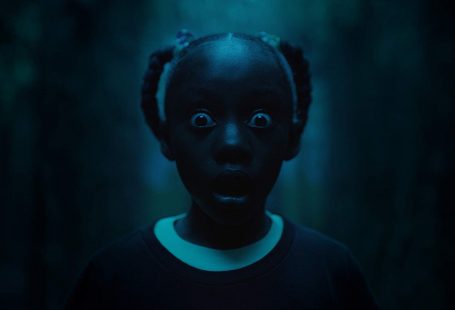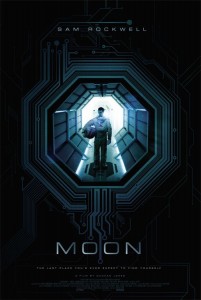 There used to be a time when sci-fi films delivered more than laser-fueled swashbuckling, aliens and space ships leaping into the stars blow stuff up. When sci-fi functioned in antiseptically spartan environments and focused less on action and more on ideas and man’s place in a scientifically accelerated world. Duncan Jones’ Moon is a tight look back at those films or better yet, a heavily influenced and transportational return to form.
There used to be a time when sci-fi films delivered more than laser-fueled swashbuckling, aliens and space ships leaping into the stars blow stuff up. When sci-fi functioned in antiseptically spartan environments and focused less on action and more on ideas and man’s place in a scientifically accelerated world. Duncan Jones’ Moon is a tight look back at those films or better yet, a heavily influenced and transportational return to form.
Set somewhere in the near but indeterminate future, life on earth is a clean, green dream come true thanks to Helium 3, a wonder element found only on the moon and harvested exclusively by megacorp Lunar Industries. The whole operation is almost completely automated and requires only a single individual– Sam Bell (Sam Rockwell)– to maintain its lunar rovers, delivery systems and four combines. Sam is assisted by GERTY (voiced by Kevin Spacey), an A.I. robot that hangs from the cieling and cleverly conveys emotion via an on board emoticon screen. Janitor/Site Engineer Sam Bell is approaching the final weeks of his three-year lunar stint. He’s mind-numbingly lonely and feeling the effects of three isolated years away from his wife and daughter when he discovers a lunar rover is missing.
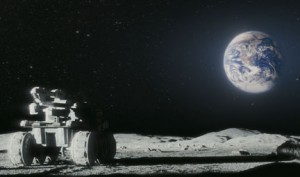 GERTY hems and haws but finally lets Sam leave the base to check things out. When he finds a crashed rover, and discovers what it carries, well– I’ll go so far as to say this isn’t a twisty movie, but the revelations and events that unfold thereafter shouldn’t be spoiled. And again, that’s not because Moon is full of mind-bending surprises. It’s fairly straightforward and willing to immediately address what many films would have saved for their third act. While this decision (in addition to another that creatively compounds and juxtaposes Sam’s character arc) may seem anticlimactic to some popcorn acclimated viewers, it frees Moon to more insightfully explore what it means to be a connectionless Sam Bell, what it means to be alone and what it means to be alive.
GERTY hems and haws but finally lets Sam leave the base to check things out. When he finds a crashed rover, and discovers what it carries, well– I’ll go so far as to say this isn’t a twisty movie, but the revelations and events that unfold thereafter shouldn’t be spoiled. And again, that’s not because Moon is full of mind-bending surprises. It’s fairly straightforward and willing to immediately address what many films would have saved for their third act. While this decision (in addition to another that creatively compounds and juxtaposes Sam’s character arc) may seem anticlimactic to some popcorn acclimated viewers, it frees Moon to more insightfully explore what it means to be a connectionless Sam Bell, what it means to be alone and what it means to be alive.
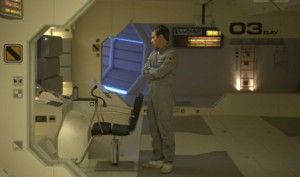 If all that sounds ethereal, artsy and boring, Moon is anything but thanks almost wholly to Sam Rockwell’s performance. Rockwell, by necessity, anchors Moon’s introspection with a compelling display of heartbreaking humanity and emotion. Aside from a few video feeds and Kevin Spacey’s telltale voice as GERTY, he’s the only human in the movie and appears from beginning to end and channels vulnerability, bravado, anger and inquiry in a portrayal that demands sympathy and introspection. His performance, alive and warm amidst the sterile moon base and the moon’s ashen surface, is Moon‘s heart and sells it from beginning to end.
If all that sounds ethereal, artsy and boring, Moon is anything but thanks almost wholly to Sam Rockwell’s performance. Rockwell, by necessity, anchors Moon’s introspection with a compelling display of heartbreaking humanity and emotion. Aside from a few video feeds and Kevin Spacey’s telltale voice as GERTY, he’s the only human in the movie and appears from beginning to end and channels vulnerability, bravado, anger and inquiry in a portrayal that demands sympathy and introspection. His performance, alive and warm amidst the sterile moon base and the moon’s ashen surface, is Moon‘s heart and sells it from beginning to end.
Spacey, as Moon‘s secondary player GERTY, needs mention as well. As the voice of the robotic station attendant who the trailers (full of red herrings, BTW) portend as ominous, Spacey’s monotone inflection is artificially detached while soothingly amiable. It’s a thing of magic– one that lends itself well to flipping the longheld sci-fi expectation of a nefarious artificial intelligence.
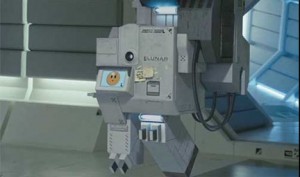 What’s truly surprising about Moon is how large this production feels. While it’s insular and private in its fiction, Moon’s world feels vast thanks to virtually seamless effects and beautiful, utilitarian art direction. Clint Mansell’s exceptionally haunting score is so sparse and affectingly lonely, its main theme is still playing through my head a day after viewing. It’s a score that symbiotically lifts the material, combined with the fantastic and 70’s sci-fi inspired production design, into a movie patient mainstream audiences could get into if given the chance.
What’s truly surprising about Moon is how large this production feels. While it’s insular and private in its fiction, Moon’s world feels vast thanks to virtually seamless effects and beautiful, utilitarian art direction. Clint Mansell’s exceptionally haunting score is so sparse and affectingly lonely, its main theme is still playing through my head a day after viewing. It’s a score that symbiotically lifts the material, combined with the fantastic and 70’s sci-fi inspired production design, into a movie patient mainstream audiences could get into if given the chance.
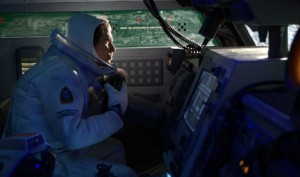 There’s a pile of discussion that could be expanded in relation to Moon‘s themes (of which there are many, not the least of which is big corporate dehumanization) but to do so would ruin the joy of the discovery experience and should be left to peel back on first viewing. Even if you’re familiar with the plot’s central premise as hinted at in the tag line “250,000 miles from home, the hardest thing to face…is yourself”, Moon‘s altruism and deeper questions–again, fueled by an exceptional Sam Rockwell– are poignant and layered regardless.
There’s a pile of discussion that could be expanded in relation to Moon‘s themes (of which there are many, not the least of which is big corporate dehumanization) but to do so would ruin the joy of the discovery experience and should be left to peel back on first viewing. Even if you’re familiar with the plot’s central premise as hinted at in the tag line “250,000 miles from home, the hardest thing to face…is yourself”, Moon‘s altruism and deeper questions–again, fueled by an exceptional Sam Rockwell– are poignant and layered regardless.
Moon is phenomenal. Duncan Jones, a first-time feature director with a huge future, has delivered something special here. I’m all superlative, but Moon is simply fantastic.


